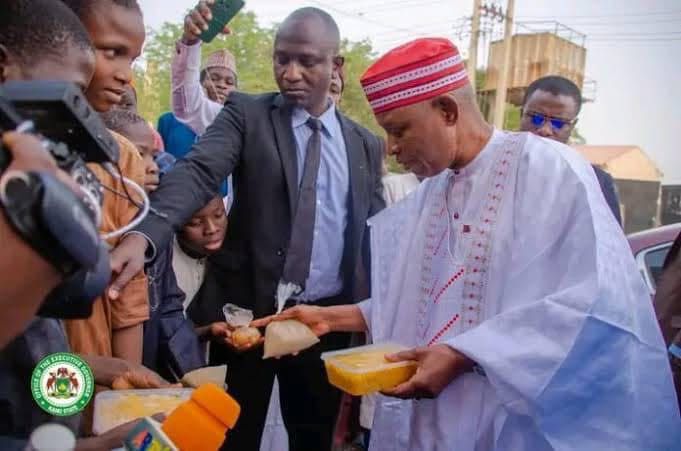Your Excellency, The Executive Governor of Kano State,
I extend my sincere greetings to you and commend your administration’s efforts in supporting the people of Kano, particularly through social welfare initiatives such as the annual Ramadan Feeding Program. This program has, over the years, served as a crucial intervention for thousands of fasting individuals, especially those struggling with economic hardship.
This article was inspired by the unfortunate event that your excellency witnessed during the last year Ramadan feeding program where you discovered dishonesty and bridge of trusts among those you trust.
However, as Ramadan approaches, I urge your government to adopt a more structured, accountable, and inclusive approach by leveraging the expertise of Non-Governmental Organizations (NGOs) and Community-Based Organizations (CBOs) to enhance implementation and ensure the program truly benefits the poorest of the poor.
Key Challenges with the Current Approach
Lack of Proper Targeting – Many who are most in need of this food aid often do not receive it due to improper identification and verification mechanisms. This results in the benefits being hijacked by those who are not genuinely poor.
Congestion and Safety Risks – The current model, which relies on large gatherings at distribution points, creates long queues that lead to stampedes, accidents, injuries, and sometimes even fatalities. Many vulnerable individuals, including elderly persons, pregnant women, and children, are often unable to access the food due to the overwhelming crowds.
Leakages and Diversion – Without a transparent and well-monitored distribution system, there are reports of food being diverted or not reaching the intended beneficiaries. This reduces the program’s impact and raises concerns about accountability.
Proposed Strategy: Leveraging NGOs and CBOs for Effective Implementation
To address these challenges, I propose a multi-stakeholder approach involving NGOs, CBOs, faith-based organizations, and community leaders in the planning, execution, and monitoring of the Ramadan Feeding Program. This will help in:
Accurate Identification of the Needy. The NGOs and CBOs, with their grassroots presence, can conduct surveys and household assessments to identify and register the real poor in communities.
This could be through Using existing community poverty data and working with religious institutions, these groups can create a verified list of the most vulnerable families, ensuring that food reaches those who need it most.
Similarly , Home-Based Food Distribution Model can be implemented . Because instead of requiring beneficiaries to queue in overcrowded centers, NGOs and CBOs can facilitate house-to-house distribution of food items. This will eliminate congestion, prevent accidents, and ensure dignity for beneficiaries who may feel ashamed to publicly collect food aid. And It will also ensure that people with disabilities, the elderly, and pregnant women receive their share without difficulty.
Decentralized Distribution Centers is another solution. This is because , instead of using a few centralized locations, NGOs can assist in setting up multiple small distribution points across wards and communities.:And no doubt this will help decongest feeding centers, reduce transportation burdens, and make food more accessible to people in rural and hard-to-reach communities.
Monitoring and Accountability Framework is critical for effective planning and sustainable success. The involvement of CSOs, NGOs, and independent monitors will ensure transparency in the process. A real-time monitoring system using community reports and digital tracking can help prevent leakages and diversion. And the government can establish a public feedback mechanism where people can report any issues related to unfair distribution.
Public-Private Partnerships (PPP) for Additional Support. The government should collaborate with private businesses, supermarkets, and philanthropists to increase food supplies through donations. NGOs, CBOs and faith-based groups can mobilize volunteers to assist in cooking, packaging, and distribution, reducing the financial burden on the state.
Call to Action for Immediate Implementation
Your Excellency, time is of the essence, and as Ramadan approaches, it is imperative to act now. I strongly urge you to:
1- Convene an emergency stakeholders’ meeting with NGOs, CBOs, and CSOs to develop a coordinated Ramadan Feeding Strategy.
2- Set up a Ramadan Feeding Accountability Committee involving government officials, CSOs, and independent monitors to oversee the process.
3- Adopt digital data collection for identifying and tracking beneficiaries, ensuring fairness and efficiency.
5- Launch a public sensitization campaign to educate citizens on how the new model will work, including how they can receive food without queuing.
Your administration has a golden opportunity to set a national model for humanitarian food distribution by ensuring that no fasting person in Kano goes hungry due to inefficiency. The people of Kano trust your leadership, and by acting swiftly on this proposal, you will strengthen public confidence, uphold justice, and fulfill the moral duty of governance.
I look forward to your administration’s bold action in ensuring a dignified, transparent, and impactful Ramadan Feeding Program this year. May Allah guide you in serving the people with wisdom and compassion.
Sincerely,
Musa Abdullahi Sufi
Senior Vision Director, SIDES
Kano State, Nigeria

